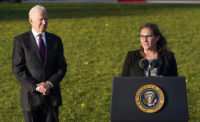After nearly three months in a holding pattern and a long day of back-and-forth negotiations among House Democrats, the chamber approved a sweeping, multi-year infrastructure funding package late on Nov. 5 that will provide an estimated $1 trillion for a wide range of infrastructure categories, including highways, transit, rail, water, power and broadband.
The vote, which occurred about 11:30 p.m., was 228 to 206. Thirteen Republicans joined 215 Democrats in favor of the bill; while six Democrats sided with 200 Republicans against it.
The Senate had passed the legislation, the Infrastructure Investment and Jobs Act, or IIJA, on Aug. 10. The House vote represents final congressional approval for the bill, sending it to President Joe Biden for his signature.
The legislation is of critical importance to construction, engineering and transportation groups and is arguably their top legislative priority. Many issued statements cheering the House action.
“It is a great day for the nation.”
Dennis D. Truax, president, American Society of Civil Engineers
“It is a great day for the nation,” said Dennis D. Truax, American Society of Civil Engineers president. "Hallelujah!!!" American Council of Engineering Cos. CEO Linda Bauer Darr wrote on Twitter.
Stephen E. Sandherr, CEO of the Associated General Contractors of America, said that the measure “provides the kind of funding needed to modernize the country's aging and overburdened infrastructure.”
Jim Tymon, executive director of the American Association of State Highway and Transportation Officials, said that the bill is “a historic piece of legislation that provides a much-needed funding increase for highway, transit, highway safety and rail programs.”
Funding is the keystone of the massive act, but it also has policy changes. One important policy provision codifies a Trump administration directive seeking to reduce the time it takes federal agencies to issue environmental approvals for major infrastructure projects.
Of the measure's estimated $1-trillion total, about $550 billion is increased funding over current baseline levels for various infrastructure categories. Highways, bridges and other major transportation projects would receive about $110 billion out of the $550 billion. Passenger and freight rail would get $66 billion, transit would receive $39 billion, airports $25 billion and port and inland waterways projects would get $17 billion.
Water infrastructure, including funds for drinking-water and wastewater-treatment projects, would be allotted $55 billion, and improvements to the electric grid would be allotted $73 billion. The bill also has an emphasis on addressing the effects of climate change, including $46 billion to increase projects’ resilience against storms, wildfires and other natural disasters.
In addition, the IIJA includes $65 billion to expand broadband infrastructure, $65 billion to build resilient electric transmission lines and $7.5 billion to construct a network of charging stations for electric vehicles,
The measure also includes important five-year reauthorizations for highway, transit and U.S. Environmental Protection Agency water programs. The surface transportation reauthorization had been scheduled to lapse on Dec. 3 under a stopgap extension.
Transportation and construction groups were particularly happy to see the five-year highway-transit reauthorization, stating that the long term provides them more certainty about funding over the next several years for major projects.
The legislation “is the most significant measure in more than 50 years to meaningfully address the condition and performance of the U.S. transportation network,” said Dave Bauer, American Road & Transportation Builders Association CEO.
Another provision of the bill would shore up the struggling Highway Trust Fund by transferring $118 billion from the general fund.
The highway and water reauthorizations had cleared the Senate Environment and Public Works Committee earlier this year. The EPA water bill, totaling $35 billion, also was approved by the full Senate earlier, and is wrapped into the big, new package.
Sen. Shelley Moore Capito (W.Va.), the top Republican on Environment and Public Works, has said the package’s highway authorization totals $303 billion, a 35% increase over the last multiyear highway bill, the 2015 Fixing America’s Surface Transportation Act.
Another provision in the bill would shore up the struggling Highway Trust Fund by transferring $118 billion from the general fund. Of that infusion, the trust fund's highways account would receive $90 billion and its transit account would get the other $28 billion.
The vote was stalled for much of the day because of disagreements over a separate $1.9-trillion climate and social policy measure. That bill, the Build Back Better (BBB) act, is another top Biden priority.
House Speaker Nancy Pelosi (D-Calif.) was at the center of the negotiations with factions within the Democratic caucus.
House Democratic progressives threatened to withhold their votes for the infrastructure bill because they first wanted to see an estimate of the Build Back Better bill's price tag from the nonpartisan Congressional Budget Office. In the end, the compromise reached was to have a House vote on that legislation by mid-November.
To assuage progressives, in the hours before the final vote, five moderate House Democrats released a statement pledging to vote for the BBB soon after they get the CBO "score" for the BBB bill's cost, and no later than the week of Nov. 15.
If the BBB wins House approval, it would go to the Senate, which is widely expected to revise the House measure.
Unlike the infrastructure bill the BBB will be taken up under the reconciliation mechanism. It permits bills to clear the Senate with a simple majority, bypassing the usual 60-vote threshold to avert a filibuster in that chamber.





Post a comment to this article
Report Abusive Comment